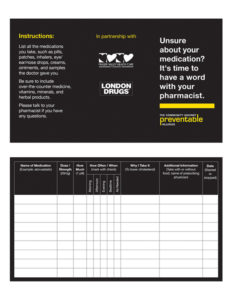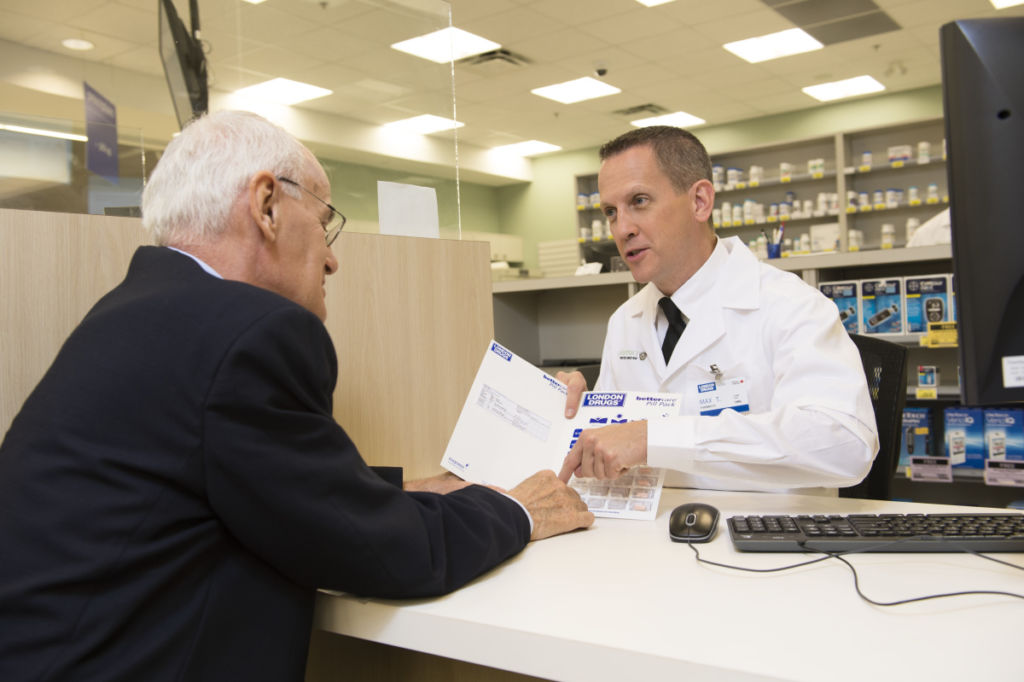Every year in British Columbia, the Drug and Poison Information Centre receives 26,000 calls about poisoning, including almost 4,000 drug poisoning cases that require hospitalization, and approximately 500 of which are fatal. A quarter of these serious cases occur among adults aged 55 and over.
Many adults over the age of 55, especially those with chronic health conditions, have multiple prescriptions. Each new drug, vitamin, or over-the-counter product that’s added to the mix increases the risk of adverse side effects and medication interactions.
Taking multiple medications on time and not taking duplicate doses by mistake is an ongoing issue for this age group and a contributing factor to the high number of serious poisoning cases.
Throughout the month of April, Preventable, London Drugs, and Fraser Health Hospital Foundations are partnering to raise awareness about the importance of medication adherence to reduce preventable overdoses and dangerous side effects when some medications are mixed – including over-the-counter drugs.
 As part of the campaign, patients can download or pick up a free card at participating London Drugs locations, which they can fill in with their current medications and anything else they are taking, including vitamins, minerals, and herbal products, and have it reviewed by a pharmacist.
As part of the campaign, patients can download or pick up a free card at participating London Drugs locations, which they can fill in with their current medications and anything else they are taking, including vitamins, minerals, and herbal products, and have it reviewed by a pharmacist.
Medication reviews and pharmacist consultations are safeguards designed to make sure that patients take all medications safely. They also help patients to understand the purpose and potential downsides of medications and to avoid serious drug side-effects.
“If you are unclear about how to take your prescription or over-the-counter medications or how supplements might interact with each other, don’t assume everything will be okay — ask your pharmacist or doctor,” says Dr. Ian Pike, spokesperson for Preventable. “Aging is a fact of life, but poisoning from medication use is not. Having an awareness of your medications and how certain drugs can interact with each other can prevent poisoning, even death.”
A recent poll conducted by Insights West on behalf of London Drugs found that one third (34%) of Canadians aged 55 or older are not taking their prescription medications properly. This includes one in five who admit that they make adjustments to prescription dosage, size, or frequency without consulting a healthcare professional. The same number (18%) say that they have trouble remembering when or if they have taken a medication.
Participating London Drugs Locations
Westminster Centre, New Westminster
Coquitlam Centre, Coquitlam
West Oaks Mall, Abbotsford
Scott 72 Mall, Delta
Langley store, Langley
Trenant Park Mall, Ladner
Cottonwood Mall, Chilliwack
Peninsula Village Mall, White Rock
Valley Fair Mall, Maple Ridge
Mission store, Mission
Morgan Crossing, Surrey
High Street Mall, Abbotsford



